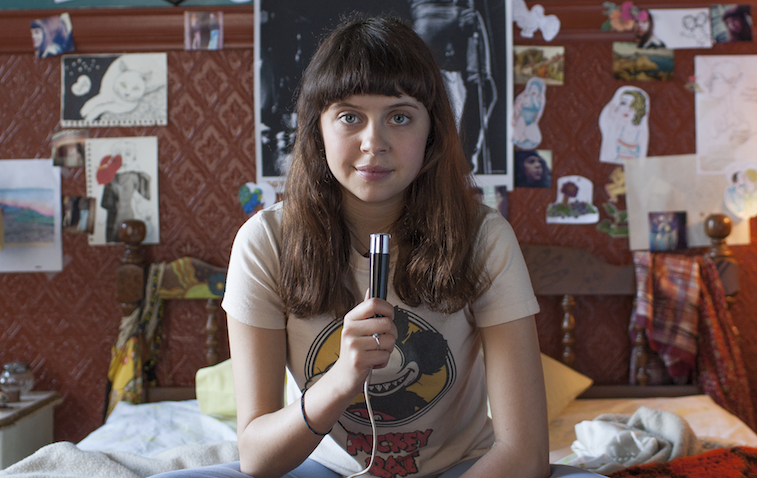By providing your information, you agree to our Terms of Use and our Privacy Policy. We use vendors that may also process your information to help provide our services. This site is protected by reCAPTCHA Enterprise and the Google Privacy Policy and Terms of Service apply.
Sundance Review: ‘The Diary of a Teenage Girl’ Unlocks the Secrets of Adolescence
Anisha Jhaveri

It’s 1976. The infamous Patty Hearst trials are well underway. All of San Francisco seems high on a perpetual, tripped-up haze, and 15-year-old Minnie Guetze has just lost her virginity — to her mother’s boyfriend.
On paper, the premise might suggest an offbeat, meandering story. But first-time director Marielle Heller’s efficient adaptation of Phoebe Gloeckner’s graphic novel (a project developed at the 2012 Sundance Director’s Lab) maintains a focused approach. With its jolting depictions of a teenage girl’s sexual awakening, the story is initially jarring, but it ultimately develops a fascinating relatability.
With the hippie era slowly eclipsed by the arrival of punk rock, Minnie (British actress Bel Powley, brilliantly unrestrained in her American film debut) undergoes her own transition — from childhood to being an adult, a complicated passage made all the more disorienting thanks to an absentee father and a mother (Kristen Wiig) who seems more interested in holding on to her own youth than in being a parent.
Minnie struggles with the usual travails of adolescence: a level of confidence largely dictated by her physical attributes and a haunting fear that she will never be desirable to the opposite sex. When she finds validation in attracting the attention of Monroe (Alexander Skarsgard), the man dating her mother, she sets off on a rocky exploration — chronicled via tape-recorded accounts — of her sexuality, and a journey towards discovering where her sense of self-worth truly lies.
 A story following the sex-driven relationship between a high school girl and a man twice her age, “Diary” could have easily fallen off the deep end into exploiting the discomfort of its topic or simply being too quirky for its own good.
A story following the sex-driven relationship between a high school girl and a man twice her age, “Diary” could have easily fallen off the deep end into exploiting the discomfort of its topic or simply being too quirky for its own good.
But as told through Heller’s acutely sensitive vision, the result is less off-putting and more of an authentic insight into a perspective grossly underrepresented in American cinema. It’s Minnie who initiates the first encounter with Monroe out of fear that she may never get another chance at sex if she doesn’t seize this one; though his attempts to resist are half-hearted at best, it’s her continuous craving for his attention that prolongs their affair.
“What’s the point of living if nobody loves you, nobody sees you, nobody touches you?” Minnie wonders into her microphone at one point. It’s rare to witness a young girl so openly express her need for physical intimacy in a coming-of-age movie, but “Diary” bravely endeavors to fill a gaping hole in contemporary portrayals of female adolescence.
While many of us may claim not to share the aggression with which she pursues her erotic impulses, Minnie’s recorded commentaries — scrutinizing her external flaws, desperately wishing to be older than she is, fantasizing about male bodies — reveal a complex, erratic, and impressionable psyche universally applicable to anybody who was once her age.
 But not everything translates so seamlessly from page to screen. Some of the dialogue feels oddly contrived, and while the comics in the novel may be integral to reflecting Minnie’s creative evolution, here, animation sequenced are more distractions than enhancements to the narrative — particularly since the adaptation doesn’t place as much emphasis as the book on her artistic development.
But not everything translates so seamlessly from page to screen. Some of the dialogue feels oddly contrived, and while the comics in the novel may be integral to reflecting Minnie’s creative evolution, here, animation sequenced are more distractions than enhancements to the narrative — particularly since the adaptation doesn’t place as much emphasis as the book on her artistic development.
And yet Hellner pulls it all off, predominantly because of her feel for the period. Against any other backdrop, Minnie’s precociousness or Monroe’s ambivalent attitude towards it may appear improbable or just plain unacceptable. But the film isn’t interested in placing a moral compass on any of its characters, making the freewheeling counterculture the perfect decade for a story that puts forth teenage angst, sexual experimentation, and childlike innocence while inviting minimal judgment in return.
Shocking but genuine, poignant and hilarious, “Diary of a Teenage Girl” could well become one of the more memorable entries in the Sundance Film Festival‘s U.S. competition. Minnie’s story may be a singular one, but its essence will undoubtedly strike a chord — not just for women, but for anyone who recalls the befuddling emotions that plagued and enriched their teen years in equal doses.
Grade: A-
“The Diary of a Teenage Girl” premiered this weekend at the Sundance Film Festival. It is currently seeking U.S. distribution
By providing your information, you agree to our Terms of Use and our Privacy Policy. We use vendors that may also process your information to help provide our services. This site is protected by reCAPTCHA Enterprise and the Google Privacy Policy and Terms of Service apply.















